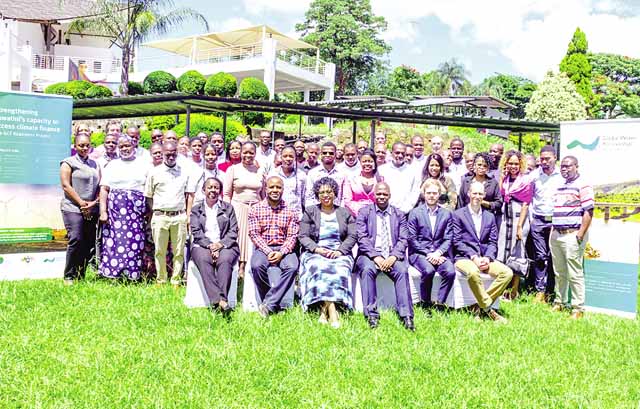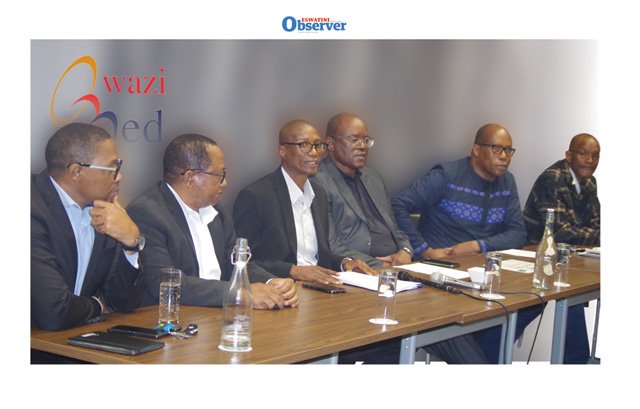By Nokuzola Thwala | 2024-03-23

Eswatini aims to have adequate water, food and energy for all people by the year 2030, which is part of the Sustainable Development Goals (SDGs).
Director of Water Affairs Makhosini Khoza, who is also Global Water Organisation Director said SDGs encouraged all countries to provide at least all basic needs for its people.
In a two-day consultation workshop held at Sibanesami Hotel, Khoza said there were three water concepts that Eswatini needed to adopt which included water adaptation and purification, disaster readiness and food security for all.
The workshop was a collaboration between Global Water Partnership (GWP) and the ministry of tourism and environmental affairs. The theme was ‘Strengthening the national designated authority’s institution and technical capacity to mobilise gender responsive climate finance for Eswatini’.
He said the aim was to develop three water concept notes to access climate finance and address the impact of climate change on water resources and management.
He said in November, they narrowed down three concept notes which they were now developing to ensure funding from the climate fund.
Khoza added that one concept note that they were developing further for fund mobilisation was the water, sanitation and hygiene (WASH) one, which touched on ensuring that WASH initiatives existed in the country.
access
“By so doing, we are able to meet the SDGs 2030. As a country, we need to ensure that we have adequate water, food and energy for all people by the year 2030. People should access clean water, sanitation and hygiene,” he said.
Meanwhile, GWP Project Manager Nqobizwe Dlamini said the objective of the workshop was to introduce the three identified project to be developed into concept notes to national stakeholders.
He added that they were aiming to validate identified project ideas with national stakeholders and further gather information on the development of each of the three concept notes.
Dlamini added that the workshop brought together about 80 stakeholders from government, non-governmental organisations (NGOs) and civil service organisations (CSOs).
He said the desired outcomes were three identified project ideas to be developed as concept notes presented to national stakeholders, information on the project ideas to be collected to inform development of three concept notes.
He added that they would expect feedback on the draft problem, solution, theory of change and potential sites for the three concept notes received.
“Eswatini is vulnerable to climate change and already experiencing many adverse impacts, such as changes in the weather patterns, increasing intensity and frequency of natural disasters, including storms and droughts and dwindling crop yields, hence climate adaptation is of utmost importance, particularly for its key economic sectors, including biodiversity and ecosystem, water, agriculture and health sectors.
“Such climate-related hazards are having adverse effects on the country and future climate change is likely to further exacerbate the situation.
“This, therefore, requires collaborative thinking and response to the challenges from a variety of sectors and actors,” Dlamini said.
He said a large proportion of the Eswatini population had a low capacity to adapt to climate change.
He stated that the predicted impacts were likely to be particularly negative on the rural population because of their high dependence on rain-fed agriculture and natural resource-based livelihoods.
Dlamini said these hazards threatened the livelihoods of the majority of the population who depended on rain-fed agriculture and natural resources.
He noted that the country had developed its initial nationally determined contributions (NDC) plan that outlined priority actions to enhance resilience and reduce vulnerability to climate change, such as improving water management, promoting climate-smart agriculture, strengthening early warning systems, and enhancing disaster risk reduction.
The project manager added that the country sees a huge investment gap for implementing water-related action on the ground to build country-wide climate resilience.
Moreover, Dlamini said Eswatini’s portfolio of water-related projects to access climate finance was relatively small.
“While existing water related projects targeting the sector have already been submitted or are under development, most of these are focused on nature-based solutions or ecosystem- based adaptation with limited focus on Water, Energy and Food (WEF) and WASH projects,” he added.
share story
Post Your Comments Below

Sisonkhe FC ……........….. (0)2
Mpendulo 55th, Thab...
Social media users have reacted with shock and sorrow to the death of former Mhlume Unite...
Health officials have reported a significant decrease in new HIV infections among men, in...

THE recent turn of events at SwaziMed has underscored deep-rooted governance challenges that thre...
All material © Swazi Observer. Material may not be published or reproduced in any form without prior written permission.
Design by Real Image Internet